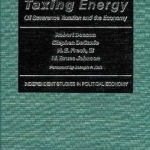Taxing Energy: Oil Severance Taxation and the Economy
BookThis item doesn’t have any media yet
1990 | Business & Finance
Severance taxes on the extraction of oil, gas, and other natural resources have been very popular with politicians because they seem invisible in being spread among a large, diffuse taxpayer base. But do such taxes have serious negative consequences overlooked by legislators? Severance taxes-taxes levied upon the production of oil and natural gas-have long been popular with state governments. Such taxes are thought to have minimal impact upon the areas where petroleum wells are located, the costs of such taxes can be "exported" to a large and dispersed consumer base in other states, and an oil or gas well cannot be moved to another state where taxes are lower. Because of these factors, severance taxes seem like ideal taxes for legislators to impose. But how do severance taxes work in the real world? Are they really as painless as they sound? Because of the immobility of the resource being taxed, do states tend to overtax? In this provocative study, the authors survey state severance taxes and find they tend to lower petroleum production, reduce jobs in the states imposing such taxes, and have negative effects that can ripple throughout a state's economy.
Severance taxes look like easy targets for state governments. But as this book demonstrates-using thorough analysis-such taxes are often downright counterproductive and can actually reduce total state tax revenues.
Related Items:
| Published by | Independent Institute,U.S. |
| Edition | Unknown |
| ISBN | 9780945999690 |
| Language | N/A |
Images And Data Courtesy Of: Independent Institute,U.S..
This content (including text, images, videos and other media) is published and used in accordance
with Fair Use.
